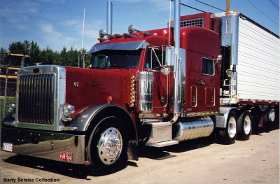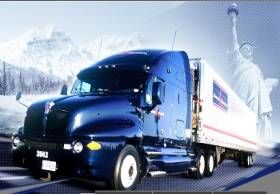Bad Weather
Topic 5084 | Page 1

Brett posted this in a while back and its worth mentioning
It all comes down to the golden rule - don't hit anything.
If you're not comfortable driving in certain conditions then don't. I'm from outside of Buffalo, NY so I've spent my entire life driving in heavy snow. The first few years I drove a rig there would be times I would be parked in conditions I probably could have done fine in but it just wasn't worth taking the risk. Later in my career as I developed the skills I was able to drive through almost anything pretty comfortably as long as I could actually see where I was going. That's usually the bigger problem. You can keep the truck on the road if you can see where the road actually is!
But in trucking there really are no guidelines or policies about driving in poor weather other than to say it's at the discretion of the driver. So always play it on the safe side.
Two other things:
1) Never, ever, ever decide you're going to keep driving because other trucks are on the road. You will never find conditions so poor that nobody will give it a shot. There will always be trucks on the road if the road is open, I don't care if it's a hurricane or a blizzard or what. Someone will be out there going for it. Don't let that sway your decision.
2) Practice in the snow. I used to take every opportunity I could find to practice winter driving in large, empty parking lots. You get in a Walmart or closed factory on a night with heavy snow and you might have your own skid pad the size of two football fields all to yourself. I used to do everything I could think of:
- drive in an arc and lock up the trailer brakes
- drive in an arc and mash the gas to get the tractor tires to break loose
- drive around using the gas pedal to make the tractor fishtail around in a circle....just anything you can think of to get that truck sliding, fishtailing, or jackknifing and then learn to recover from it.
Obviously a huge word of caution here - make 100% certain you're in a safe area to do this. Watch for telephone polls, light polls, and even things like nearby houses where people might get annoyed with the noise you're making in the middle of the night. But finding an area to practice your winter driving skills is huge. I've done it my entire driving life and I still do it to this day. I'll take my big redneck Chevy 4x4 out in snowstorms. I'll drive around town and play around in big, empty lots. I want to test what the truck is capable of and I want to learn how to get it back under control once I start sliding.
I can say with 100% confidence that I avoided several wrecks over the years because I was able to get the truck back under control after it started sliding. If I hadn't practiced winter driving over the years I never would have known how to make the right choices and get that thing back under control.
OOS:
When a violation by either a driver or company is confirmed, an out-of-service order removes either the driver or the vehicle from the roadway until the violation is corrected.

Undoubtedly, many of you seasoned drivers have experienced situations in which a quick decision had to be made with regards to an approaching snowstorm, tornado, hurricane, or other major weather event in your direct path. How do you react? Do you drive x miles away from it or take shelter? How do most companies react? Paid miles? Weather is a concern of mine as I begin this new journey as a driver.
That's a good question but sadly most of us drivers will just say, "We Keep Trucking!"

I think my tolerance for bad weather will increase as my skills and confidence increase. In that regard, knowing you limits and following your instincts will be the best guidance. You can't drive what you can't see, as I've heard it.
-mountain girl
OWI:
Operating While Intoxicated

Brett posted this in a while back and its worth mentioning
It all comes down to the golden rule - don't hit anything.
If you're not comfortable driving in certain conditions then don't. I'm from outside of Buffalo, NY so I've spent my entire life driving in heavy snow. The first few years I drove a rig there would be times I would be parked in conditions I probably could have done fine in but it just wasn't worth taking the risk. Later in my career as I developed the skills I was able to drive through almost anything pretty comfortably as long as I could actually see where I was going. That's usually the bigger problem. You can keep the truck on the road if you can see where the road actually is!
But in trucking there really are no guidelines or policies about driving in poor weather other than to say it's at the discretion of the driver. So always play it on the safe side.
Two other things:
1) Never, ever, ever decide you're going to keep driving because other trucks are on the road. You will never find conditions so poor that nobody will give it a shot. There will always be trucks on the road if the road is open, I don't care if it's a hurricane or a blizzard or what. Someone will be out there going for it. Don't let that sway your decision.
2) Practice in the snow. I used to take every opportunity I could find to practice winter driving in large, empty parking lots. You get in a Walmart or closed factory on a night with heavy snow and you might have your own skid pad the size of two football fields all to yourself. I used to do everything I could think of:
- drive in an arc and lock up the trailer brakes
- drive in an arc and mash the gas to get the tractor tires to break loose
- drive around using the gas pedal to make the tractor fishtail around in a circle....just anything you can think of to get that truck sliding, fishtailing, or jackknifing and then learn to recover from it.
Obviously a huge word of caution here - make 100% certain you're in a safe area to do this. Watch for telephone polls, light polls, and even things like nearby houses where people might get annoyed with the noise you're making in the middle of the night. But finding an area to practice your winter driving skills is huge. I've done it my entire driving life and I still do it to this day. I'll take my big redneck Chevy 4x4 out in snowstorms. I'll drive around town and play around in big, empty lots. I want to test what the truck is capable of and I want to learn how to get it back under control once I start sliding.
I can say with 100% confidence that I avoided several wrecks over the years because I was able to get the truck back under control after it started sliding. If I hadn't practiced winter driving over the years I never would have known how to make the right choices and get that thing back under control.
OOS:
When a violation by either a driver or company is confirmed, an out-of-service order removes either the driver or the vehicle from the roadway until the violation is corrected.

Thanks for looking that up HM!

This one is my favorite. Anyone can drive in bad weather but can you avoid a crash and keep yammering on the CB?

This one is my favorite. Anyone can drive in bad weather but can you avoid a crash and keep yammering on the CB?
http://kotv.videodownload.worldnow.com/KOTV_20131209233607427AB.mp4
OMG that was crazy. Thnx for scaring the poop outa mee..lol

This one is my favorite. Anyone can drive in bad weather but can you avoid a crash and keep yammering on the CB?
http://kotv.videodownload.worldnow.com/KOTV_20131209233607427AB.mp4
OMG that was crazy. Thnx for scaring the poop outa mee..lol
You wait, Winter is Coming and that means we will see a lot of FEDEX trucks on the side of the road again.

Correct me if I'm wrong but the reporter called that a jackknife? Looks pretty straight to me.
I couldn't see all that happened through the snow he kicked up but it looked like the FedEx driver handled his rig really well, going into a 360' turn rather than jackknifing or flipping a trailer.
It actually looked like an amazing save. Am I right about this? Comments? Learning points, anyone?
-mountain girl
New Reply:
New! Check out our help videos for a better understanding of our forum features

















Preview:
This topic has the following tags:
CB Radio Dealing With The Weather Safe Driving Tips Trucking News Videos







 TT On Facebook
TT On Facebook
Undoubtedly, many of you seasoned drivers have experienced situations in which a quick decision had to be made with regards to an approaching snowstorm, tornado, hurricane, or other major weather event in your direct path. How do you react? Do you drive x miles away from it or take shelter? How do most companies react? Paid miles? Weather is a concern of mine as I begin this new journey as a driver.